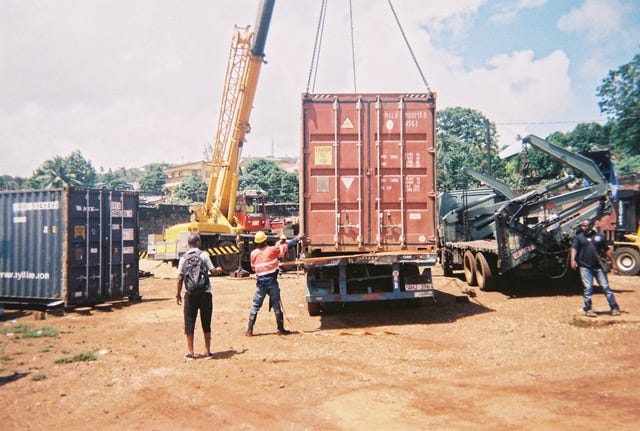Welcome to the 11 new subscribers since my last email 👋🏼
When I graduated from ETH no job description felt like a “hell yes”
I believe the value you can create when you’re split between engineering and business (solving complicated vs complex problems) is undervalued. At the same time, it has never been easier to learn and to develop software.
It seems obvious to me that more young, technical people would pursue working on problems they know rather than solve others’ problems for pay. But virtually nobody is doing that. Or at least I’m not in that bubble. Definitely, not at ETH.
Am I missing something or is this an overlooked opportunity?
I’m giving it a shot. I had so many ideas during university and was frustrated that I couldn’t spend more time working on them. There is never going to be a better time than now. I still have a lot of questions but I’m going to figure things out along the way.
My goal for the next six months: get good at writing software fast
There is a strong compounding effect when no information is lost between the person understanding the problem and the person building the solution. Each problem is special, but engineering is a skill I can train.
Having fun is the guiding principle for the next months. Intrinsic motivation is the greatest superpower you can have. I want to allow for time to explore interests that may not immediately seem related to my life's direction. Some of the best things that happened to me originally started like this.
Money is a problem
It’s the most obvious reason why technical grads can’t work on their own ideas. And its absence is the biggest risk to my plans for the next months.
That’s why I’m freelancing
I build first products or add machine learning features to existing products. I once thought that my non-CS background (Statistics MSc. doesn’t count as CS for me) would disqualify me as a developer. I’ve now learnt that it’s my biggest advantage. I’ve learnt the technical conventions but I deviate where it makes sense. What matters is the overarching goal and getting to a solution fast.
Committing to this decision was still a leap of faith. The expenses of studying in Zurich outpaced my savings, scholarship and what I earned at the lab. I handed in my master’s thesis with a bank balance of -2,300€. My overdraft limit is 10k so that’s how far I can go. I’ve freelanced before but those jobs always came as somewhat of a coincidence. Now I’m betting on my ability to make these things happen.
January was the official start to this new chapter and I want to transparently share how it’s going. It adds accountability to my thoughts and helps me stick to the facts in deciding what to do next. I also hope that it helps and motivates anyone considering a similar choice and who might stumble across this in the future.
Palta Labs: Exists, but doesn’t depict reality
The backdrop: Vincent is a good friend of mine facing a similar situation. He loves coding and robotics. But he also sees robots and computers as a means to an end. We started talking: what could we work on together?
Both of us are financially constrained. Solving the problems of others was a good value proposition: Learn about new problems, practice solving them, and get money buying you more time for your ideas. We decided to freelance together. The domain palta-labs.com was bought in November.
We decided that the default going forward would be that we’re not working together until we are.
In December there was a turn of personal affairs in Vincent’s life. He moved from Munich to Zurich and is starting a new job this week. Our timelines wouldn’t align well within the next 12 months.
Whatever my plans are for the next months and year are again independent.
Read more about Vincent here and about Palta Labs here.
How I spent my time
My full goal for the next six months is “Build development speed and think about what I want to work on for 7 years plus”.
I’m afraid of two things.
Not taking the logical steps
The first part is clear, the second is vague. The steps I’m currently taking are good, but it’s easy to forget why you started and lose track of where you’re heading. Sharing what I’m doing with you here helps me reflect on my actions. With each email, I end up rewriting everything five times until my thoughts are clear(er).
Waking up to a reckoning that I didn’t work hard enough
Nobody is watching what I’m doing at the moment. That has many advantages. I can chase my thoughts and hunches without having to explain why it makes sense to others. But it also has its risks. One is that it’s very easy to avoid doing the hard things. I’m not worried about procrastinating but focussing on the wrong things.
Measure: track distraction-free working time
I've restarted an adjusted version of my pre-exam routine of tracking work hours with a Pomodoro timer (I use Tomito) and logging this, along with daily exercise and optional notes, in a spreadsheet.


During any kind of break, I pause the timer. At university, 7.5 hours of study would roast my brain, but now the ideal amount is uncertain. Getting code out of my brain is easier than putting math into it. I've shifted from tracking study hours to categorizing time into buckets. This lets me visualise my time distribution and compare days and months.
Own project: 102 hours (56%)
It’s hard for me to stay in touch with my deaf grandmother but I had an idea how to fix that. I’m calling it GrannyMail for now and I’ll share more about it in my next email. In essence, it's a WhatsApp (and Telegram) bot that helps you turn voice memos into physical letters.
The original date I wanted to finish was January 23rd. Yet as of today, February 28th, I am still working on it. Seems like I was off by a bit. Why?
Constantly refactoring my code
Whenever I uncovered a new problem I tried not to implement a quick fix but ask myself what an app 10x the size might look like. I think that’s a good principle for getting better at coding. I used type hints, and extensive abstractions and wrote tests for virtually everything. All in all, I had three occasions where I refactored (tech term for rewriting) over 50% of my app and the corresponding tests.
Refactoring your code is an incredible luxury. You never have time to refactor your code when you’re working. Yet it's when you learn the most. Feeling slow is frustrating but what matters isn’t how fast I am now, but how fast I’ll be in the future.
Learning: ChatGPT aids in exploring programming's "unknown unknowns" but falls short in guiding higher-level design decisions, such as when to use modules versus classes. How can I learn more about “good” software engineering and software design patterns in a structured way? Maybe Robert Martin’s books are a good start? Domain Driven Design is another keyword that I should look more into.
Freelance work: 44.5 hours (24%)
December was about acquiring the first project. Vincent and I had calls with quite a few people but nothing materialised. I think most people were curious about what we were doing, but without a serious problem, they were looking to solve.
Then through a friend’s recommendation, I got introduced to a legal AI start-up that had raised funding but had no engineers and no product. They had just had a bad experience with a previous freelancer who only thought in technical terms and didn’t deliver a solution on time. The perfect setup for us/me.
Financials and economic reality
I’ve been working on small demos and MVPs for them since. Billed hours so far: 16 in the last days of December, 32,75 in January and 16,5 in February. I charge 100€ per hour and hence earned 3,275€ in January.
I mentioned 44.5 hours in the heading but only billed 32.75. Why? There were some tasks that I could have solved but saw them as an opportunity to learn by digging a bit deeper before starting the work. It’s a win-win: I have an imminent reason to learn more and the client gets a better outcome without paying. Focusing too much on input/output would be misleading in light of why I started this journey.
100€/h initially sounded like a lot to me, but then I was reminded of taxes. Conservatively calculating, it's more like 65€ for me and 35€ for the German tax office. That leaves me with ~2,100€ for January. Nothing I’m going to build savings with, but it's enough to sustain myself. Wait, my insurance is going up from 120€ to 600€ next month because I’m not a student anymore. Hm…
Learnings:
I should batch my work together in days. Getting emails with “Could you add these two things by tomorrow?” requires you to stop whatever you’re doing, disrupts your flow but may end up as only 1.5 billable hours.
On acquiring more projects: Software is abstract. People can’t picture what I do. I need to put more visual examples of my work out there.
Taking on misaligned freelance projects could heavily waste time. On the flip side, the right projects could offer the same learnings as working on my own ideas while allowing me to sustain myself. How do I find them/can they find me?
7 hours of the YC platform (4%) cost me more than 27 hours
I’m generally motivated by other humans but currently only work on my own. I signed up for Y Combinator’s co-founder matching platform hoping to find others in a similar situation. Its biggest value, I thought, was that it’s only known by those in the right internet niche or social bubble. It should have a good pre-filtering.
I had seven calls but deactivated my profile after call #5. It was very hard to return to my coding state of mind and focus after having meet-and-greet calls. I felt like I was losing entire afternoons of focus without any direct benefit. I met one cool guy though, Victor, and we’ve been talking every third week or so since.
Learnings:
No unnecessary calls during the day. Focus on coding.
Using the YC platform only makes sense with a very clear outcome in mind. My idea of “Meet interesting people” does not fit this. I would also only talk to technical people the next time.
Four guiding thoughts for the next month
Focus harder on coding
There are no clear metrics against which I can measure what constitutes success. Focussing on money earned is definitely misleading.
I should increase the time coding (own projects or freelance) as much as possible such that whatever insight I find will reach me sooner. Investing 9 working hours per day vs. 7 makes things happen in September that would have happened in December. Also, the momentum created by things happening is very motivating. Luckily I’ve got my tracker so I can check whether I’m really improving on this.
My work has a path dependency - Income will follow the interest
Some freelance subtasks made me think “Why are you paying me 100€ per hour for this” and at the same time made me think “I should be taking much more per hour for these things”.
In a perfect world, I would only do interesting freelance projects that have the same learning pace as my own projects. But that’s not that easy.
People will rather pay you for what you’ve already done, than where you’re going. Luckily, I’m not desperate and I have time. By building and sharing my projects I can influence the probabilities of what others will want to hire me for in the future.
Another idea growing on me is that it would be cool to help out friends or friends of friends for free: People who have an idea, but can’t get going because they’re non-technical and can’t afford a developer out of pocket.
Great ideas don’t come to you when you’re sitting in a WeWork
I’ve got a small backlog of ideas I’m excited about. But I’m questioning whether this will lead to something bigger. What’s my strategy when I’m ready to work on something more long-term?
It was my half year in Sierra Leone that sparked an interest in what I think are the most interesting problems. For example, how do you make intra-continent container freight easier in Africa? It was a nightmare for us but I heard that that’s normal.
Maybe I should do some crazier things that will make bigger ideas look less crazy. One idea I have is to visit port cities in Africa, talk to different actors and write an article series about African container logistics. This series by BrandEins sparked this idea.


Read more
Now is not the time to act on the last point. I want to focus on building by engineering muscle. What I could do more of now though is read. Currently, I’m mostly interested in how other people reflect on their lives.
In the last two months, I read Hackers and Painters and the Almanack of Naval Ravikant (h/t to Laurenz for the recommendation). I’m currently reading Writing to Learn, but I’m not sure if I like it that much. I’m thinking about reading Principles, Start with Why or It’s not Complicated next.
Do you have any strong book recommendations?
Top Reads
1 - Cursor.sh, a VS Code-like editor, integrates GPT/Co-pilot incredibly
I’m a fan and a paying user. The biggest difference to Github Copilot is that 1) you can highlight code and give instructions for what to do (not just autocomplete) and 2) you can directly copy code from different files into an integrated chat or even just tell the LLM to consider the entire codebase for a question. (h/t to Julian for the recommendation)
2 - Chatbot arena builds an ELO ranking of LLMs
According to some people, including Andrej Karpathy, this might be one of the best sources to tell which LLM has the best general answers (Chatbot Arena; find the ranking on Hugging Face)
3 - This guy built an offline voice assistant using Mistral 7b via Ollama and Whisper
I think there will be a massive surge in using voice to interact with computers. Ollama is a tool that makes it easy to run LLMs locally. This assistant is a very cool application. Ollama saves you a lot of API call dollars here and I want to try it out as soon as I wrap up my current project (GitHub)
4 - The most interesting AI Models and Tools I saw
+ Meta’s open-source MAGNeT generates studio-quality audio at 7x the speed of other models (GitHub)
+ Open-Interpreter (not by OpenAI) is an open-source repo that lets you work with your terminal in a chat-like manner (GitHub)
+ PyTorch Lightning has created a web-based editor that allows you to train your code on GPUs on demand. This solved a big problem that I had during my thesis for which Merantix Momentum had built its own tooling (Lightning.ai)
5 - My most interesting AI news
+ OpenAI finally has a GPT4 turbo model and prices for some services are cheaper (OpenAI)
+ Mistral launched Mistral Large, its biggest model, supposed to compete with GPT4. It’s a bit worse but ~20% cheaper. Unfortunately, Mistral formerly being open-source and open-weight is moving more into a closed source direction. Mistral Large isn’t public. (Tech Crunch)
+ Google is going open-source but its model is excessively woke and shows historic figures such as George Washington as black without being prompted (The Daily Beast)




